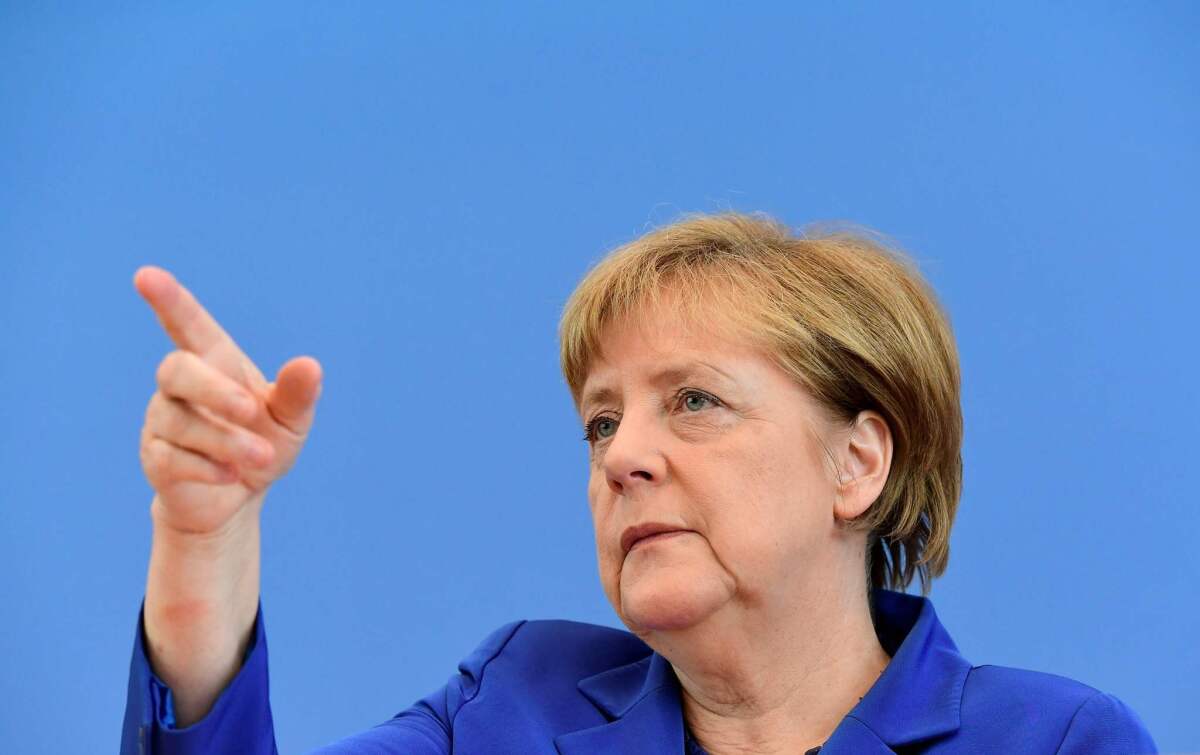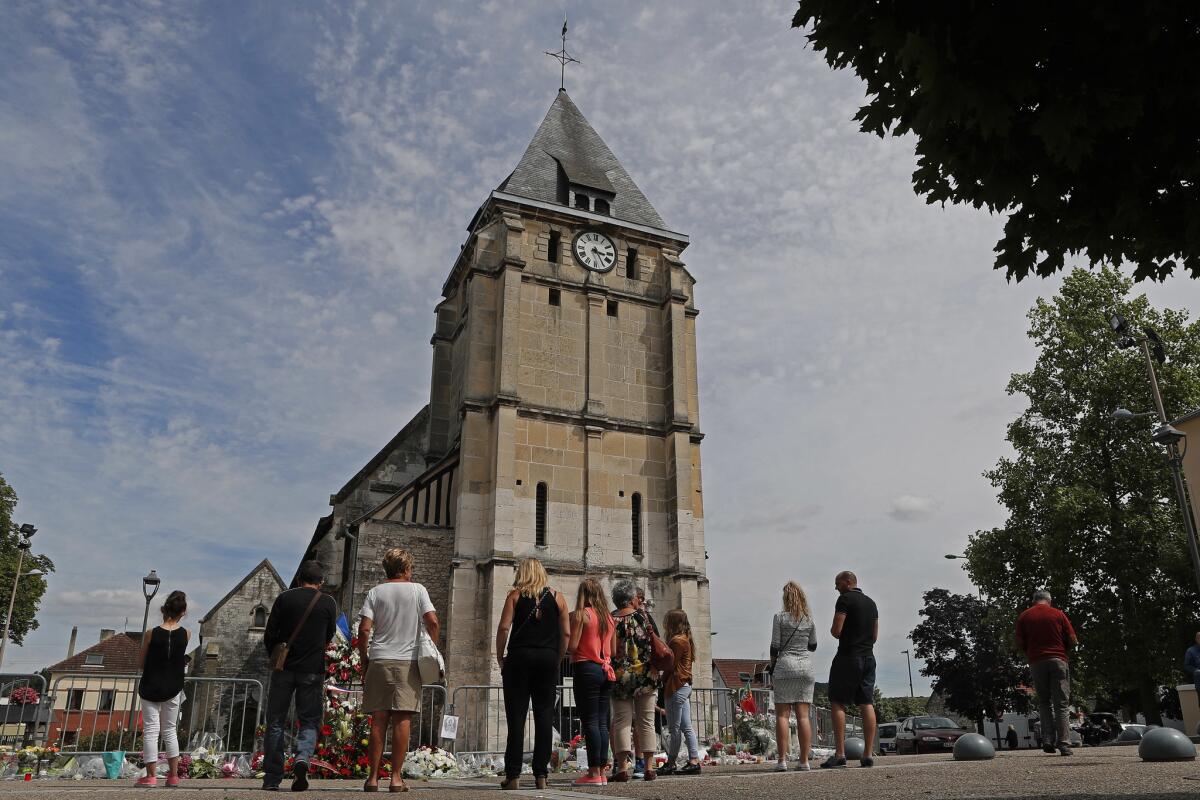How Angela Merkel’s call for calm in Germany echoes the U.S. presidential campaign

- Share via
Three words, no coincidence: “We’ll manage it.”
German Chancellor Angela Merkel, in her first substantive response to a string of violent episodes over the last 10 days, on Thursday repeated the same utterance she made famous last year as the nation opened its borders to an enormous flood of refugees and migrants.
Merkel’s calm insistence that German society could absorb large numbers of newcomers from war-torn countries — despite safety fears and rising criticism of her migrant policies — carried echoes of the passionate debate over immigration that is roiling the U.S. presidential campaign.
Whereas Republican nominee Donald Trump has threatened to deny Muslims entry and build a wall to keep out Mexicans, the party of his Democratic rival, Hillary Clinton, has painted diversity and openness as crucial elements of the American experiment.
In her annual summer news conference, the German chancellor announced new measures aimed at helping authorities pinpoint and act on security threats, but at the same time made it clear that she believed that too heavy-handed a reaction to recent events would play into the hands of militant groups.
Merkel is determined to stay the course on welcoming migrants into Germany, which has become increasingly controversial — that’s obviously the bottom line.
— Christopher Chivvis, associate director of Rand Corp.âs International Security and Defense Policy Center
“They want to damage our way of life, our openness and, yes, our ability to take in people in distress,” the German leader said. She called the absorption of migrants and refugees, more than 1 million of whom entered Germany in 2015, a “historic task.”
Merkel’s calculated repetition of last summer’s signature phrase “Wir schaffen das” — “We’ll manage it” — was widely interpreted as a deliberate signal that she harbored no qualms over the decision to throw wide the gates to those fleeing violence and persecution.
The number of arrivals this year has dropped off dramatically as a result of a European agreement with Turkey to stem the flow of migrants across a narrow stretch of the Aegean to Greece, but the issue remains a lightning rod for debate.
“Merkel is determined to stay the course on welcoming migrants into Germany, which has become increasingly controversial — that’s obviously the bottom line,” said Christopher Chivvis, the associate director of Rand Corp.’s International Security and Defense Policy Center.
In the southern German state of Bavaria, where three of four recent episodes of bloodshed took place, officials said Thursday that they would add an additional 2,000 police officers in the next three years and set up special divisions to monitor Islamic extremists and fight cybercrime.
Germany’s European neighbors, too, are caught up in tangled questions of assimilation, national identity and public safety in the face of recent traumatic events.
In France — where Islamic State claimed responsibility for a Bastille Day truck rampage on a Riviera promenade that killed 84 and for this week’s knife slaughter of an elderly Roman Catholic priest in Normandy — authorities on Thursday disclosed that the second of the two slain church assailants, like the first, had managed to carry out the attack despite being on a security watch list.

The government of President Francois Hollande, already under pressure over perceived security lapses before the July 14 truck rampage in Nice, came under sharp new pressure over the disclosures that the second of two young church attackers, whose identity was disclosed Thursday, had also aspired to join Islamic State on the battlefield in Syria.
Analysts said it was important not to conflate the differing circumstances of a drumbeat of attacks on European soil this month.
Islamic State took responsibility for two strikes in Germany: a July 18 knife-and-ax rampage aboard a commuter train outside a Bavarian town by an Afghan teenager, and six days later, a suicide bombing outside an open-air concert, also in southern Germany, by a Syrian man facing deportation. The train attack injured four passengers and a female passerby; the suicide bomber killed only himself, but injured 15 bystanders.
They were the first attacks claimed by Islamic State in Germany.
But German officials were markedly careful not to jump to conclusions during a gunman’s deadly rampage on July 22 in Munich, Bavaria’s capital, and a lockdown that shut down the country’s third-largest city for hours. That caution was warranted: The assailant turned out to be a German teenager of Iranian descent described by authorities as fascinated by mass murderers, but with no known ties to extremist groups.
Bavaria’s interior minister, Joachim Herrmann, told journalists Thursday that the Munich shooter apparently thought it was auspicious that his birthday, April 20, was the same as Adolf Hitler’s.
Another episode the same day as the suicide bombing, in which a Syrian man hacked a female co-worker to death with a meat cleaver, unsettled many Germans despite what authorities said was a lack of any political overtones associated with the attack.
Merkel and her allies have stressed that the vast majority of those seeking shelter in Germany pose no threat. But the chancellor’s once-invincible popularity has been significantly eroded by the social upheaval that has accompanied the refugee flood.
And the crucial accord with Turkey could be imperiled by Turkish President Recep Tayyip Erdogan’s increasingly bellicose stance toward Europe and the West in the aftermath of a failed coup against him.
Germany, like France, is scrambling to decode online forensic evidence that could point to attackers’ methods, motives and potential accomplices.
More details emerged Thursday about the Syrian suicide bomber, Mohammed Daleel; Herrmann said the man had been in touch via an online chat with someone in an unidentified Middle East country shortly before blowing himself up.
Merkel, whose upbringing in the former East Germany is seen as having strongly marked her views on the responsibility to take in those needing a safe haven, urged compatriots to not let anxiety cause them to lose sight of democratic values.
“The fact that the events caused great insecurity” isn’t in question, she said. “But fear can’t be a good counsel for political actions.”
laura.king@latimes.com
ALSO
Syria’s Assad offers amnesty to rebels, who call it ‘meaningless’
Intelligence trove provides details of Islamic State recruitment drive
Concerned over killers seeking ‘glory,’ French news outlets to stop publishing photos of terrorists
More to Read
Sign up for Essential California
The most important California stories and recommendations in your inbox every morning.
You may occasionally receive promotional content from the Los Angeles Times.













